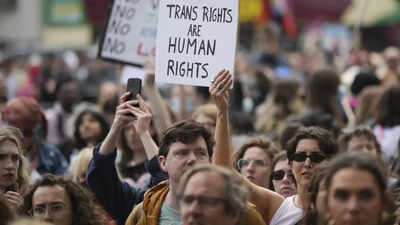Supreme Court Temporarily Blocks New Deportations Under Alien Enemies Act

In a significant and urgent legal development, the United States Supreme Court has issued a temporary order prohibiting the Trump administration from deporting any Venezuelan nationals currently detained at the Bluebonnet Detention Center, located in west-central Texas. This ruling came in light of the Alien Enemies Act, a seldom-invoked legislative measure originating from the 18th century, which allows for the swift deportation of foreigners deemed a security threat by American authorities.In a brief notice released early Saturday morning, the Supreme Court stated, "The government is directed not to remove any member of the putative class of detainees from the United States until further order of this court." Notably, Justices Clarence Thomas and Samuel Alito dissented from this decision, highlighting the contentious divide within the Court regarding immigration enforcement policies.The American Civil Liberties Union (ACLU) raised alarm on Friday evening, warning that immigration authorities were preparing to restart deportations under the Alien Enemies Act, despite previous Supreme Court decisions that limited its application. Reports surfaced late Thursday indicating that several Venezuelan detainees were being informed of their imminent deportation from the Bluebonnet facility. ACLU attorney Lee Gelernt conveyed to NPR that, as of late Friday, migrants were seen being loaded onto buses in preparation for their removal.This escalation in deportation efforts seems to contradict a recent ruling by the U.S. Supreme Court, which upheld the Trump administrations ability to continue deportations under the Alien Enemies Act but stipulated that detainees must be granted due process to challenge their deportation orders. The government has claimed that 137 migrants associated with the Venezuelan gang Tren de Aragua have been deported already under this act, including a group of individuals sent to a prison in El Salvador.NPR has not been able to independently verify the number of detainees facing deportation from the Bluebonnet facility. Furthermore, the U.S. Department of Homeland Security has refrained from providing specific details or addressing additional inquiries regarding the current situation.Assistant Secretary of Homeland Security Tricia McLaughlin stated, "We are not going to reveal the details of counter-terrorism operations, and we are complying with the Supreme Court's ruling." This statement underscores the tension between national security considerations and the rights of detained individuals.In response to the immediate threat of deportations, the ACLU submitted a request to the Supreme Court on Friday for an emergency injunction and a stay of removal. They argued that individuals subjected to the Alien Enemies Act should receive at least a 30-day notice before any deportation attempts. The ACLU criticized the government's notice as inadequate, stating, "The notice the government is providing does not remotely comply with the Supreme Court's order. At a minimum, the notice must be translated into a language that individuals can understand. Most importantly, there must be sufficient time for individuals to seek review. As during World War II, that notice must be at least 30 days in advance of any attempted removal."The group previously sought a federal judge's intervention to halt new deportations altogether but was met with resistance. During an emergency hearing on Friday evening, Federal Judge James Boasberg expressed his concerns that the forms presented to the migrants did not adequately inform them of their rights to contest the removal orders, stating, "It doesn't say you have the right to contest, you have the right to challenge anything. It's just telling you here's the notice, you're getting removed. That certainly seems problematic to me."In defense of the process, the Justice Department contended that the notices being provided were in accordance with the Supreme Courts previous guidance on the matter. Over recent days, federal judges in various districts have actively blocked deportations enacted under the Alien Enemies Act. The ACLU has since escalated its legal actions, filing a lawsuit to halt deportations at other Texas detention centers, including Bluebonnet, which is strategically located about halfway between Lubbock and Fort Worth.The ACLU has alleged that many Venezuelan migrants were specifically transferred to the Bluebonnet Detention Center with the intent of deportation under the Alien Enemies Act; however, the government has denied these allegations. Earlier this week, Judge Boasberg found probable cause that the Trump administration may have committed criminal contempt by failing to adhere to his rulings. Nonetheless, the Supreme Court has ruled that only judges who have jurisdiction over the facilities where migrants are held can issue orders to halt their deportations.This developing situation remains a focal point of legal and political debate, with significant implications for immigration policy in the United States. The complexities of balancing national security with the rights of individuals are at the forefront of this ongoing legal battle. Reporting for this story includes contributions from Stella M. Chvez of The Texas Newsroom and Ximena Bustillo of NPR.



























